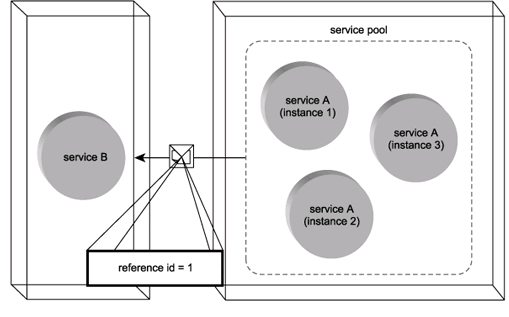WS-Addressing规范主要描述了两个概念:EndpointReference 以及Message Addressing Properties。
在详细介绍EndpointReference前,首先了解一下Endpoint的概念。在Web
Services中代表一类逻辑功能的服务实现可能存在不同的Endpoint,每一个Endpoint可能代表了一种不同的绑定方式,甚至对外表现出不
同的接口,比如Endpoint A可能使用TCP协议通讯,而Endpoint
B则可能使用Http协议。通过EndpointReferrence我们就可以引用到相应的Endpoint上,从而访问该服务。因此你可以想象
EndpointReferrence的功能和WSDL中的Service元素很相象,下面就是EndpointReferrence的XML
Infoset。
<wsa:EndpointReference>
<wsa:Address>xs:anyURI</wsa:Address>
<wsa:ReferenceProperties>... </wsa:ReferenceProperties> ?
<wsa:ReferenceParameters>... </wsa:ReferenceParameters> ?
<wsa:PortType>xs:QName</wsa:PortType> ?
<wsa:ServiceName PortName="xs:NCName"?>xs:QName</wsa:ServiceName> ?
<wsa:Policies> ... </wsa:Policies>?
<xs:any/>*
</wsa:EndpointReference>
其中由<
wsa:Address
>
和<
wsa:ReferenceProperties
>
元素共同决定了服务地址。
而以下是WSDL的Service元素
<service name="StockTraderService">
<port name="StockTraderServiceSoap" binding="tns:StockTraderServiceSoap">
<soap:address location="http://idior.cnblogs.com/StockTrader.asmx" />
</port>
</service>
不过在WSDL中并没有考虑到当一个有状态的服务(尽管大多数的服务应该没有状态)拥有多个实例时的情况,此时如何定位到某个特定的服务实例?比如
当用户向Service发出请求后,服务器为该用户创建了一个实例,其中维持了用户对服务请求的状态,典型的例子如购物篮。为了让该用户在下次请求服务时
依旧能定位到上次的服务实例,此时Service将在第一次的请求的回复消息中携带上该服务实例的EndpointReference,而不仅仅是一个
URL地址,如此用户在下次访问服务时就可以利用<
wsa:ReferenceProperties
>
元素来定位到之前的那个服务实例,从而维持住用户的状态。如下图所示:

Figure 1: A SOAP message containing a reference to the instance of the service that sent it.
虽然在WSRF(Web Services Resource
Framework)和WS-Notification规范中都使用了EndpointReference的这个特性来定位Service,
但是该方法仍然值得商榷。通过额外的属性而不是仅仅依靠URI来定位资源,这点是否合适?在W3C的Architecture of the World
Wide Web, Volume One一文中认为"Distinct Resources must be assigned to
Distinct URIs",并且在Roy Thomas Fielding提出的REST的架构中也充分证明了这一点。 如果你查看一下Web
Services Addressing Working Issues
List会发现其中的第一个Issues就是讨论的这个问题,并且事实证明Web Services Addressing Working
Group抛弃了使用<
wsa:Address
>
和<
wsa:ReferenceProperties
>
元素联合定位服务的方法。在新的版本的WS-Addressing规范中EndpointReference的XML Infoset已经被修改成下面这个样子:
<wsa:EndpointReference>
<wsa:Address>xs:anyURI</wsa:Address>
<wsa:ReferenceParameters>xs:any*</wsa:ReferenceParameters> ?
<wsa:Metadata>xs:any*</wsa:Metadata>?
</wsa:EndpointReference>
虽然在新方案中仍旧保留了<
wsa:ReferenceParameters
>
元素,但是该元素并不像之前的<
wsa:ReferenceProperties
>
对
服务定位起决定作用,它仅仅是一个附带属性,你可以利用它来定位,但Web Services Addressing Working
Group小组并不推荐这些做法。这么一来就不知道WSRF(Web Services Resource
Framework)和WS-Notification规范的工作组如何应对了,估计也只能用<
wsa:ReferenceParameters
>
来替代了。
EndpointReference
新的设计方案使得EndpointReference和URI十分接近,而相关的文章又非常之少,并且对于在服务请求前通过何种方式获得
EndpointReference我也一直持有疑惑,因此EndpointReference的介绍就不再深入展开。
My Doubt
个
人理解Client可以从第一次请求Service后从Service的返回消息中Message Addressing
Properties的ReplyTo元素获得Service
EndpointReference,而如何在第一次请求服务前获得EndpointReference就不得而知了
相关文章:
WS-Addressing Message Addressing Properties (转)
WS-Addressing 问题的引出(转)
分享到:












相关推荐
w3c发布地ws-addressing标准,包括endPointReference 和message information header
1. WSA.EndpointReference:这是WS-Addressing中Endpoint Reference的表示,用于指定服务实例的位置。 2. WSA.EndpointReference.ReferenceParameters:存储与EPR相关的参数,这些参数是EPR的一部分,但不参与消息...
3. **EndpointReference (EPR)**:在WS-Addressing规范中,EndpointReference对象代表了服务的地址和通信细节。CXF客户端可以利用EPR动态地指定服务的位置。 4. **ServiceRegistry和服务发现**:在大型分布式系统中...
- **定义**:Apache Axis2是基于Java的一个开源的WebService框架,它支持多种标准(包括SOAP1.1、SOAP1.2、WS-Addressing等),并且具有轻量级、模块化的特点。Axis2提供了强大的工具集来简化WebService的开发过程。...
### ONVIF Discovery消息格式详解 #### 一、概述 ONVIF(Open Network Video Interface Forum)是一个标准化组织,致力于制定视频...<s:Envelope xmlns:xsi="http://www.w3.org/2001/XMLSchema-instance" xmlns:xsd=...
import org.apache.axis2.addressing.EndpointReference; import org.apache.axis2.client.Options; import org.apache.axis2.rpc.client.RPCServiceClient; public class HelloWorldClient { public static void...
import org.apache.axis2.addressing.EndpointReference; import org.apache.axis2.client.Options; import org.apache.axis2.rpc.client.RPCServiceClient; public class RPCClient { public static void main...
import org.apache.axis2.addressing.EndpointReference; import org.apache.axis2.client.Options; public class WebServiceAxis2 { private static RPCServiceClient serviceClient; public static String ...
import org.apache.axis2.addressing.EndpointReference; import org.apache.axis2.AxisFault; import org.apache.axis2.client.Options; import org.apache.axis2.client.ServiceClient; import org.apache....